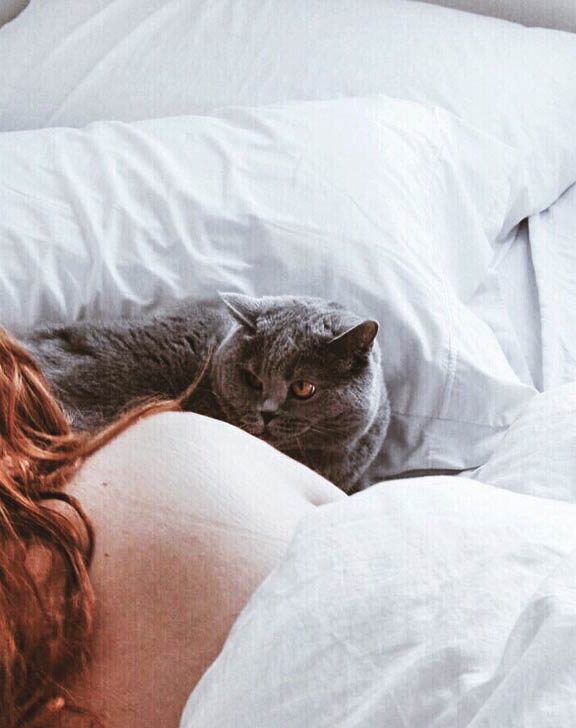For many of us, pets are full-fledged family members. They are allowed and forgiven as much. They are even allowed to sleep in the same bed as their owners. But is it the right thing to do? Despite the fact that the habit of sleeping with pets in the same bed did not appear yesterday, the debate on this topic has not subsided to this day. Pets – dangerous sources of allergens or personal psychologists, always ready to help – we understand together with specialists.
Safety first
The main requirement for a pet is that it must not pose a danger to all family members. Therefore, the bedroom is definitely not worth keeping a terrarium with snakes, spiders, and crocodiles. Of course, it is better to refrain from the varan, cougar, lynx, meerkat, which are becoming increasingly popular among home breeders. But the classic set, including cats, dogs (except for fighting breeds), and harmless rodents like hamsters or chinchillas will be appropriate for the bedroom and home in general. Especially since having four-legged friends is not only pleasant but also useful.
Caution: Pay attention to your bedding
Cats and dogs can become harmful for your bed: they can tear, lick or even molest the sleeping owner’s body with their paws. They carry on their fur a lot of allergens from different animals and plants that can cause no less severe an allergic reaction in humans than pollen grains. In addition, pets’ saliva contains a bacterium called “Staphylococcus”, which causes a form of staphylococcus infection (infection of the skin and mucous membranes).
Also, if you have a dog that weighs 100 pounds, this can damage the construction of a bed. This is a situation of, “I will sleep better without him.” Cats can also be harmful to your bedding. The main thing that you have to pay attention to at the cat’s presence in the bedroom – it’s their claws, especially if the cats use them on your favorite blanket or couch.
Step 1:
Consider changing your regular bed to a platform bed. They are especially accessible for pets and you won’t need any stairs or ramps.
Step 2:
Invest in a high-quality mattress. The mattress should provide adequate support, be durable enough, and have high wear resistance. Check this article with high-quality options for platform beds.
Step 3:
Invest in high-quality pillows. The pillows should support your neck and head, be durable enough, and have high wear resistance.
Step 4:
Invest in a high-quality blanket. As said before, cats love to sharpen their claws on bedding materials, so you will need to get one that is resistant enough to the cat’s sharp claws.
Pets in bed
The beneficial effects of our smaller brothers on the psychophysical health of their owners have been scientifically proven. Experiments have shown that daily contact with animals increases the level of the “happiness hormone” oxytocin, suppresses the synthesis of the “stress hormone” cortisol, reduces the risk of heart disease and allergic reactions, and helps strengthen the immune system. And scientists from the University of California have proven that pets prevent the development of some forms of cancer in their owners. But the benefits of pets don’t end there. The researchers went further in the question and decided to find out how right it is that dogs and cats sleep in the same bed with their owners. Until now, many were convinced that such a nocturnal roommate was unhygienic.
“Companionship with animals lowers blood pressure and normalizes the pulse,” says St. Petersburg otorhinolaryngologist Helen Berry. – Four-legged animals successfully reduce the level of nervousness of their owners, have a positive effect on their emotional state and mood. However, too close and careless contact with their tails carries the risk of contracting helminth infections, toxoplasmosis, and most commonly – to get an allergic reaction.
Indeed, animals are carriers of a number of bacteria that can be transmitted to humans through close contact and pose a risk to humans, says veterinary expert Jane Heller. However, according to the expert, if the animal is kept clean, vaccinated and regularly checked by a veterinarian, these risks are minimal. To be more specific, the chances of getting infected by an animal are the same as catching the disease from another person in bed. At the same time allergists and immunologists traditionally do not recommend letting animals into your bedroom to people suffering from asthma or allergies.
Animals in the bedroom: pros
Ancient Romans often made the legs of their beds in the form of animal paws – it was a traditional and reliable way of protection from evil spirits. Perhaps this strategy is supported by numerous modern studies that speak of the benefits of having animals around humans. A study at mdpi.com confirms:
About 80 percent of respondents with physical ailments felt much less pain while sleeping with their pet, in contrast to those who deny themselves this pleasure.
Lonely people found that when a beloved pet sleeps next to them, the oppressive feeling of loneliness disappears, and half of those surveyed admitted that without the support of a pet they would not be able to live a normal life at all.
The scientific experiment, which observed people with sleep disorders, came to the conclusion that in every second case, the presence of a favorite pet at night contributed to a quick fall asleep. Sometimes sleep can be disturbed, but about this later.
Pets help to make the morning awakening pleasant and positive, and a good mood in the morning – the key to a good day!
In 2009, American scientists experimentally proved that people who let pets into their bed have virtually no psychological disorders such as depression, hypochondria, etc. Also, the participants of the study had more motivation and determination, lower levels of anxiety in contrast to those who kicked the animals out of bed.
Animals in the bedroom: disadvantages
“As a doctor, I still do not recommend letting an animal in the place where a person sleeps,” emphasizes Helen Berry. – In addition, it is absolutely necessary to regularly and more often than usual wet cleaning, and bed linen should be washed at 60 degrees, not lower.”
Experts note several disadvantages of the nighttime neighborhood with pets. For example, pets in bed can disrupt the owner’s sleep. The different sleeping and waking mode leads to the fact that animals often wake up before the person and wake him up. Before falling asleep, the pet may frolic in bed and keep people awake. In addition, people are disturbed by the snoring of the animal.
Perhaps few people with severe allergies will keep in their bedroom agent of reaction, but we should not forget about the other troubles. Perhaps you will feel discomfort due to high humidity near the aquarium or because of the special means that are used for the hygiene of this type of housing – air conditioners, biological additives, water purifiers, and so on. And if you are used to sleeping all night with the windows open, it can cause serious harm to heat-loving tropical fish.
From this, we can conclude that there is no universal answer to whether to let the pet in bed or not. Such a decision must be made by each owner individually. If the pet does not cause discomfort at night, then why not, but if the owner’s sleep is disturbed because of this, then despite the immense love for the four-legged man, it is better to sleep with him in different places.
A cozy place for your pet
Of course, every pet needs its own place to live: an aquarium, a cage, a house or a cot. Sometimes pets sleep with their owners not because they like proximity to humans, but simply because of the comfort of the place. Provide pets with a comfortable, cushioned lie-down, and they may voluntarily leave your bed. For example, cats will appreciate a lodge that:
- stands in a warm part of the apartment;
- Is closed enough so no one will disturb their sleep;
- has soft walls and a base.
To avoid that the cat’s bed becomes a breeding ground for bacteria, it should be cleaned regularly. The cushion, on which the cat sleeps, should be washed once a month, and the house itself should be cleaned not less than every two months. By the way, felinologists advise not to disturb the cat when she is in the house, even if she hid there in the moment when you scold her. The animal must feel that the place is safe, and only then it will take root in it.
As for dogs, their requirements for a sleeping place are just the opposite. They need to control everything, so their bed should be located in a place with good visibility and on a little rise from the floor, 8-10 cm, to protect the four-legged man from draughts. The hallway is not a good place for the dog to rest: passing household members will disturb his sleep. And, of course, the cot itself should be comfortable for the dog and the right size. To determine the size you can, measuring the pet from the tip of his nose to the tip of the tail, the resulting number to add 20-30 cm – and it will be the size of the ideal recliner.
Helen Berry recommends: “Minimize in the apartment places of possible accumulation of dust and hair: refuse to use carpets with high pile, close bookshelves, and cabinets with doors. You will have to give up a large number of statuettes and souvenirs on the shelves.”
So, if you have decided to put a pet in your bedroom, make the necessary conditions beforehand. Pay attention to how you feel: if you notice signs of allergies, unpleasant smells or noise, it is better to place the pet in another room. Keep your pet’s health in mind: regular vet checkups and routine vaccinations are a must for pets.





